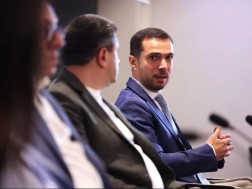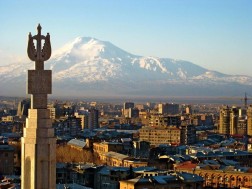In an exclusive interview with BMG, David Urbaneja-Furelos, Unit Head for Private Sector Infrastructure Finance in the Caucasus Region at the Asian Development Bank (ADB), discusses key initiatives and projects in Armenia. He shares insights on the role of the private sector in infrastructure development, addressing economic challenges, and advancing the green agenda. The conversation covers innovative financial tools like Armenia’s first sustainability-linked bond, as well as prospects for developing the country's capital market and fostering sustainable growth.
Projects in Infrastructure are crucial for Armenia's economic development and welfare. You are covering private sector infrastructure finance in the region. Can you please provide an overview of private sector infrastructure projects in Armenia and the region?
Thank you very much. As you know, at ADB, we approved our country partnership strategy for Armenia the period from 2024 to 2028. Under this strategy, we are focusing on both the public and private sector angles to support the economic growth of Armenia.
Within the private sector, we have traditionally focused on energy projects, particularly renewable energy and related infrastructure. However, we recognize other critical areas where the economy and the country require substantial support. In the past, ADB has conducted technical assistance initiatives to identify key sectors for potential intervention. For instance, in the telecoms and ICT sectors, we found significant opportunities for improvement in connectivity and internet speed, which are areas we are now prioritizing.
In parallel, we are also focusing on access to finance. Across the Caucasus region, we have worked extensively on developing capital markets in recent years. Capital markets serve as an alternative source of financing for companies, offering opportunities to raise capital in both hard and local currencies. This diversification helps businesses access better financing terms.
In recent years, ADB has become the leading financial institution in the Caucasus region, fostering the development of ESG (Environmental, Social, and Governance)-thematic capital markets. This includes supporting the first green bonds, gender bonds and sustainability-linked bonds. We believe Armenia has considerable potential for capital market development, which can significantly benefit from collaborative efforts by all stakeholders.
What are the key challenges faced by the private sector in Armenia, and how is ADB addressing these challenges?
Armenia faces several challenges, many of which we are all familiar with. One major challenge is the country's landlocked nature, which makes regional connectivity vital. This is why sectors like telecoms can play a crucial role, as well as enhanced access to capital.
Access to finance remains a significant obstacle for companies in Armenia. Supporting new avenues to financing enable businesses to improve the services they provide to citizens. At ADB, we aim to create various financing options to address this issue, helping companies enhance their access to funding and ultimately benefitting the public.
As part of our efforts, ADB has conducted technical assistance projects in Armenia. For example, we have assessed the potential for wind power to diversify the renewable energy sector. We have also focused on ICT, telecoms, and financial institutions to address systemic bottlenecks. Through these initiatives, ADB identifies challenges and designs solutions to provide support through public sector, private sector, or blended interventions.
Can you please share insights about the innovative transaction you financed in December – Team Telecom Armenia’s Sustainability-Linked Bond? What are the key outcomes of this project and tool?
Certainly. ADB, as a development bank, prioritizes projects and transactions with innovative, sustainable development angles. By linking sustainability and financing, we aim to support both economic and environmental improvements.
In December, Armenia’s first sustainability-linked bond was issued, in collaboration with Team Telecom Armenia, and the leadership and structuring of ADB. This bond waslisted on the Armenian Stock Exchange and ties the company’s financing to its ability to achieve specific GHG (greenhouse gas) emission reduction targets.
For instance, the company has committed to reducing its GHG emissions by 20% by 2027 and 40% by 2029, covering Scope 1, 2, and 3 emissions. This is a significant step, as the company is making a strong commitment to sustainability in line with Armenia’s obligations under the Paris Agreement.
Additionally, the bond incorporates gender equality milestones, encouraging the company to enhance its performance in this area. It also supports investments in infrastructure to improve access to faster and better-quality connectivity for housing subscribers.
By anchoring this transaction, ADB is helping to mobilize other private and retail investors, thereby fostering capital market growth in Armenia.
What other initiatives are you pursuing or planning to activate capital market development?
This sustainability-linked bond is a great example of how tangible transactions can act as a precedent for capital market development. By tailoring such transactions to the Armenian market and attracting both local and international investors, we aim to set key milestones for market growth.
In this case, ADB’s role as an anchor investor in a $75 million-equivalent bond listed on the Armenian Stock Exchange demonstrates our commitment to strengthening the local market. It enhances credibility for the stock exchange, Armenian risk, and the market as a viable destination for investments.
Looking ahead, we plan to pursue similar transactions, working with different issuers and expanding into other ESG-themed bonds. Our team is already exploring new opportunities to continue supporting the Armenian capital market with innovative and sustainable financing tools.
The last question is about the green economy and green transition. What role does the Asian Development Bank play in supporting projects aimed at developing the green economy in Armenia, and what specific initiatives are planned to facilitate the country's transition to sustainable and environmentally friendly economic growth?
ADB plays a vital role in supporting Armenia’s green transition. Locally-based teams in Armenia and the broader Caucasus region work closely with stakeholders to understand market needs and push the boundaries of sustainability.
One of our key differentiators is our ability to bring expertise from other markets in Asia and the Pacific and tailor it to the Armenian context. For example, we have introduced sustainability-linked bond frameworks previously developed in other regions to Armenia’s market.
Through technical assistance programs, we help identify market opportunities and support issuers in creating sustainable financing tools. For example, we assist with second-party opinions and framework development for ESG financing.
We also prioritize capacity building by deploying consultants to strengthen local expertise, which is crucial for long-term development. These efforts help improve market functionality and promote sustainable practices among private sector stakeholders.
In summary, ADB remains committed to facilitating Armenia’s transition to a green economy by fostering sustainability, capacity building, and innovation across multiple sectors.























